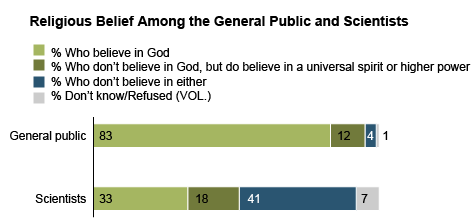Not being able to find a designer does not mean that science says or has shown that there is no designer.
Agreed.
I presume you would agree that if anyone said that science has shown that leprechauns do not exist, they would be wrong and that saying that would be a matter of faith and not science.
Agreed again, although I would not say that they were wrong about leprechauns but wrong to assert that they don't exist as if he knows that. He might be correct, but he can't know that. We should remain agnostic about propositions which can neither be ruled in nor out.
If some scientist believes there is no designer, (better a "designer" instead of "design", because it can be said that things are designed by nature) then they are doing that based on religious belief.I IOW it is not science which tells people that there is no designer.
This even sounds like something you would agree with.
Agreed, although I wouldn't call it a religious belief even though I agree that it is a faith-based belief.
It is interesting that "those who don't believe in either" and "those who don't know/Refused" are separate categories, but according to atheists on this forum, "those who don't believe in either" should be in the same category as "those who do not know"
I would call somebody who doesn't believe in a god atheist. The higher power part is problematic. I believe in a higher power than man. Grvity would be an example. But I still consider myself an atheist.
It goes hand in hand with my belief in the truth of the Bible and that has the value of being able to bring me everlasting life.
What you're saying is the value of your faith to you is the hope for everlasting life, but you don't call it hope. You consider it a fact. That's the difference between faith and hope - belief. OK.
Maybe it is too much for you to speak for all skeptics. You should probably just speak for yourself.
What I wrote was, "What the skeptic says is that absent evidence of intelligent design, he doesn't believe that the universe was intelligently designed, but for the reason implied in this thread, he also doesn't assert that there was no intelligent designer. He remains agnostic on the question." That's a description of agnostic atheism, the only rational position for the skeptic, empiricist, and agnostic atheist. Did you want to try to refute that?
You do not know how to detect design or how to detect "no design" but you want a scientific way to do that before you will believe in a designer.
I otoh, believe in a designer until it can be shown that there is none.
Yes, we're different that way. Absent sufficient evidence, I don't believe.
I would have thought that human language is a different coding system than genes
Yes. Both are substitution codes (codons for amino acids and words for their definitions), but only one must be learned and understood. One requires a conscious creature with a literal language (original sense of the word), the other can be used by unconscious ribosomes to create proteins
However that actual existence of those associations and the means to decode what has been encoded seems to have required an intelligence to have made that system.
Not to me or the rest of the atheists who are familiar with that science. And of course, it's an incredulity fallacy to conclude that a designer god exists because you can't imagine how nature could have generated these objects without supervision and intention.

